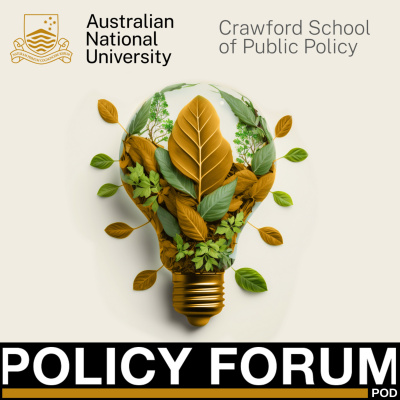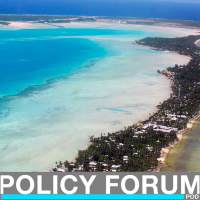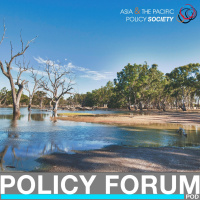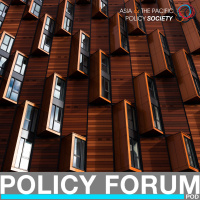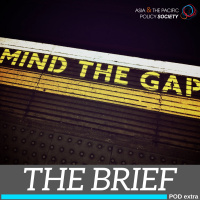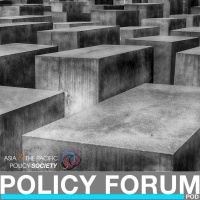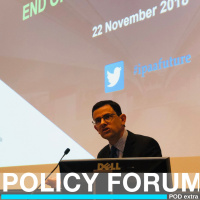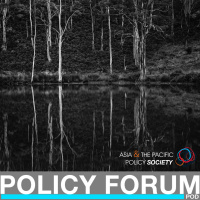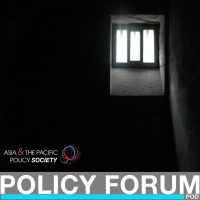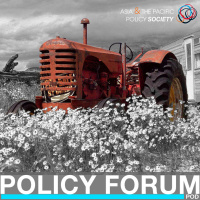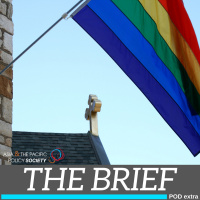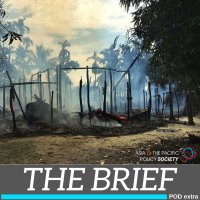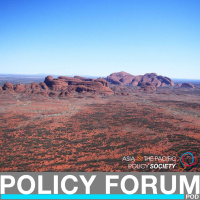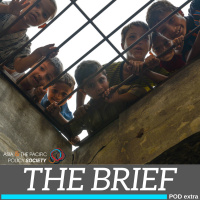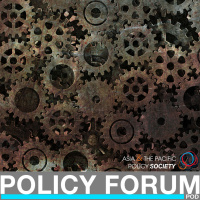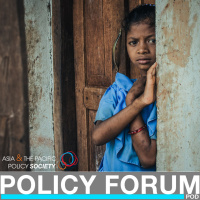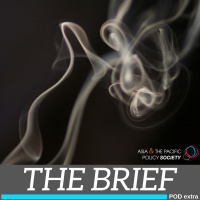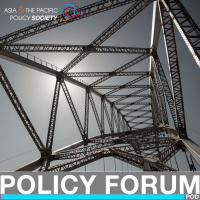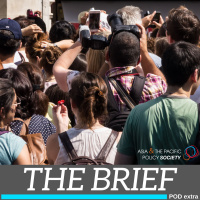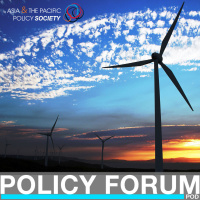Sinopsis
Policy Forum Pod is the podcast of Policy Forum.net - Asia and the Pacific's platform for public policy debate, analysis and discussion. Policy Forum is based at Crawford School of Public Policy at the Australian National University.
Episodios
-
A Pacific-specific approach to regionalism
08/02/2019 Duración: 01h04minThis week on the pod we take a look at regional cooperation amongst the Pacific Islands and the challenges they face in coordinating policy efforts. How can Pacific island nations work together better to tackle some of the big issues facing the region, and increase their clout on the global stage? On this week’s Policy Forum Pod, a panel of experts take a look at economic development, globalisation, non-communicable diseases, and climate change in the region, and the importance of concerted and coordinated efforts in tackling them. Our presenters – Jill Sheppard and Martyn Pearce – also take a look at a few key policy issues in the news, including the Royal Commissions into both the Murray-Darling Basin and Australia’s banks, as well as proposed tax reforms and franking credits. They also discuss some of the comments you’ve left us and your suggestions you've give us for future pods – so keep them coming! This episode brings together three experts on regionalism amongst the Pacific Islands: Matthew Dornan is
-
Australia's environmental performance review
01/02/2019 Duración: 53minIn the first episode of Policy Forum Pod of 2019, experts from the OECD discuss their new report looking at Australia’s environmental challenges and performance. With the release this week of the Organisation for Economic Cooperation and Development’s (OECD) new report looking at Australia’s environmental performance, we are joined by three of the report’s authors to take a look at a difficult decade, what the country is doing well, and where it might perform better. The panel examines what political tools might be best used to steer the nation in the right direction, and discuss the need for an improvement in how to better inform and engage civil society on these essential issues. Additionally, our presenters – Jill Sheppard, new presenter Tess McGirr, and Martyn Pearce – also go over some of the recent comments and questions and talk about some of the big policy issues that have played out over the last few weeks, including the recent Menindee fish kills, Australia’s migration stance, and delve deeper into
-
Ghosts of policy past, present and future
07/12/2018 Duración: 01h29minWhat were the worst policies of the recent past? What were the policy highlights of 2018? What policies would help improve the world in 2019? We put these questions to more than 20 researchers at the Australian National University spanning an enormous range of policy issues, from foreign aid to fire prevention, drought policy to discrimination, social media to international security. This special end-of-the-year podcast comes in two parts. First, host Martyn Pearce leads a discussion with previous presenters of Policy Forum Pod – Quentin Grafton, Jill Sheppard, Sharon Bessell and Julia Ahrens – on everything that went right and wrong in policy in 2018. Next, host Nicky Lovegrove takes the reins, bringing Sue Regan and Maya Bhandari into the mix, as they take a look at the policies the world needs moving into a new year. Martyn Pearce is Editor of Policy Forum. Sophie Riedel is Policy Forum’s roving reporter for this special end of year episode. Quentin Grafton is Professor of Economics and ANU Public Policy F
-
The Brief: Women in politics
03/12/2018 Duración: 17minWomen face a considerable challenge getting into politics, and it doesn’t necessarily get any easier once they’re there. In Australia, the total number of women in parliament is just over 30 per cent, and their treatment by male colleagues at times leaves a lot to be desired. So what can Australia do to create more space for women in politics and policy-making? In her final episode as presenter of The Brief, Edwina Landale chats with Blair Williams about why Australia’s Liberal and Labor parties differ when it comes to gender quotas and safe seats, how female politicians are represented in the media, and whether Australian politics is becoming more or less gendered. Blair Williams is a PhD candidate at the Australian National University working on a comparative study of women prime ministers, and is the Social Media Coordinator for the Australian Political Studies Association (APSA) Women's Caucus. Edwina Landale is the presenter of The Brief. She is a student of Politics, Philosophy, and Economics at the ANU
-
Preventing and punishing genocide
30/11/2018 Duración: 48minDecember 2018 marks the 70th anniversary of the Genocide Convention, which emerged following the global outrage at the mass atrocities of World War Two. Yet despite the world’s determination to end genocide, the past seven decades have seen numerous mass killings – from Indonesia and Cambodia, Rwanda and Bosnia, to the crisis currently unfolding in Myanmar. So is the Genocide Convention still fit for purpose? On this week’s podcast, hosts Julia Ahrens and Luke Glanville hear from an international legal expert, a historian, and an atrocity forecaster. Topics discussed include whether political groups should be included in the legal definition of genocide, why the recent ethnic cleansing in Myanmar was not just predictable but predicted, and why the rise of China might be bad news for the prevention of genocide. Melanie O’Brien is a Senior lecturer at the Law School at the University of Western Australia. She specialises in international criminal law, human rights law, peacekeeping and feminist legal theory. Sh
-
Pod extra - Making the public service fit for the future: David Williamson
27/11/2018 Duración: 57minIn this special Policy Forum Pod Extra, Deputy Secretary of the Department of Prime Minister and Cabinet David Williamson discusses the Australian Public Service review and what it'll take to make the country's policy machinery fit for purpose. This podcast is a recording of an address given by Mr Williamson at Crawford School of Public Policy as part of the Institute of Public Administration Australia (IPAA) ACT Future Leaders Series finale 2018 held on Thursday 22 November. This podcast is hosted by Sue Regan. Show notes: Institute of Public Administration Australia Future Leaders Program Podcast: Is Australia's policy machinery fit for purpose? Glyn Davis and Helen Sullivan See acast.com/privacy for privacy and opt-out information.
-
Water justice
23/11/2018 Duración: 45minFrom a drought-stricken countryside to Murray-Darling mismanagement, Australia is facing a number of water-related issues. But it’s not just urban and agricultural water supplies that are under pressure. Also threatened are the many Indigenous Australians who depend on ailing waterways for their economic and cultural survival. On this week’s podcast, presenter Quentin Grafton hears from Virginia Marshall and Katherine Taylor about why water governance can’t ignore the issue of justice, and how Australian policymakers can turn the tide of water policy for the better. This episode is hosted by Martyn Pearce and Sue Regan. Virginia Marshall is an Inaugural Indigenous Postdoctoral Fellow with the ANU School of Regulation and Global Governance (RegNet) and the Fenner School of Environment and Society. Katherine Taylor is a PhD scholar at Crawford School of Public Policy, where she focuses on water governance and Indigenous water policy in Western Australia. Quentin Grafton is Professor of Economics and ANU Public
-
Counter-terrorism and civil liberties
16/11/2018 Duración: 01h08minAn apparent terrorist attack in the heart of Melbourne has ignited a familiar debate over whether Australia has got its counter-terrorism policy settings right – and what proposed legislative changes might mean for civil liberties. On this week’s podcast, hosts Nicky Lovegrove and Sharon Bessell hear from a national security expert, a legal scholar and an ethicist about encrypted communication, detention without charge, democratic accountability, and whether terrorism receives a disproportionate amount of concern from policymakers. Listen here: Jacinta Carroll is the Director of National Security Policy at the ANU National Security College. Previously, Jacinta was the inaugural Head of the Counter-Terrorism Policy Centre at the Australian Strategic Policy Institute. Dominique Dalla-Pozza is a Senior Lecturer at the ANU College of Law and was the co-convenor of the ACT chapter of the Electoral Regulation Research Network. Her research deals with Australian Public Law and Australian National Security Law. Chris
-
Rusted off: how rural voters in Australia are taking policy change into their own hands
09/11/2018 Duración: 48minFar from being ‘rusted-on’ voters, rural Australians are deserting the major parties in greater numbers than their city counterparts. And they’re not just abandoning status-quo politics, but finding new ways of inspiring community action and taking policy change into their own hands. So what are urban policymakers getting wrong about rural voters? And what policy lessons should we be taking from the countryside and applying to the country? On this week’s podcast, hosts Martyn Pearce and Jill Sheppard hear from a journalist, a political scientist, and two rural leaders at the forefront of community politics. Gabrielle Chan has been a journalist for more than 30 years. Since 2013, she has worked for Guardian Australia as a political correspondent, Politics Live blogger and senior writer. Her latest book, Rusted Off: Why Country Australia Is Fed Up was released in September 2018. Peter Holding is on the board of Directors for Farmers for Climate Action – an alliance of farmers working to see the agricultural sec
-
The Brief: Freedom of religion, or freedom to discriminate?
05/11/2018 Duración: 23minA government review of freedom of religion laws in Australia last month sparked outrage after it suggested that faith-based schools ought to have the right to turn away gay students and teachers. This week on The Brief, Edwina Landale hears from Professor Margaret Thornton about Australia’s legal ambiguity when it comes to religion and discrimination. Topics discussed include what the proposed religious exemptions would involve, whether employment and educational discrimination should be treated differently, and how Australia’s secular-religious divide has changed over the last 20 years. Margaret Thornton is Professor of Law at the Australian National University, specialising in socio-legal issues and feminist scholarship. She is a Barrister of the Supreme Court of NSW and the High Court of Australia, and has published extensively on issues relating to discrimination and the law. Edwina Landale is the presenter of The Brief. She is a student of Politics, Philosophy, and Economics at the ANU. Show notes | The
-
The Brief: Sanctioning Myanmar
29/10/2018 Duración: 25minAustralian Foreign Minister Marise Payne has announced sanctions on five military generals accused of leading last year's violent crackdown on the country's Rohingya people. The move follows the release of an independent UN Fact-Finding Mission report, which condemned the Myanmar military for killing thousands of Rohingya civilians and perpetrating forced disappearances, mass gang rape and the burning of hundreds of villages. This week on The Brief, Edwina Landale hears from former Australian Ambassador to Myanmar Trevor Wilson about why neither the international community nor Aung San Suu Kyi have been able to end the violence. Trevor Wilson retired in August 2003 after more than 36 years as a member of the Australian foreign service, and after serving as Australian Ambassador to Myanmar (2000-03). Since October 2003 he has been a Visiting Fellow on Myanmar/Burma at the Department of Political & Social Change, School of International, Political & Strategic Studies, Australian National University. He
-
A vision for the North
25/10/2018 Duración: 55minNorthern Australia comprises roughly half of the Australian continent, but certainly receives less than half the attention from policymakers. It’s a region with challenging geography, wide cultural diversity, and enduring social inequality, and ever since Federation, it’s been the subject of grand thought bubbles from politicians with visions of turning the region into Australia’s next economic powerhouse. On this week’s podcast, hosts Sharon Bessell and Quentin Grafton hear from Peter Yu about the economic, geographic and development challenges facing the north, and why there might in fact be more solutions than problems. Peter Yu is a Yawuru Man from Broome in the Kimberley region in North West Australia with over 35 years’ experience in Indigenous development and advocacy in the Kimberley and at the state, national and international level. Sharon Bessell is the Director of the Children’s Policy Centre in Crawford School of Public Policy, ANU College of Asia and the Pacific, The Australian National Universi
-
The Brief: Seeking asylum
22/10/2018 Duración: 25minAustralian Prime Minister Scott Morrison has recently raised the prospect of transferring asylum seekers on Nauru to New Zealand – a move that, if implemented, could signpost a change in Australia’s strict approach to refugee policy. The country’s offshore detention of asylum seekers has long been a controversial policy topic. The exact conditions within camps are unknown, and it can be difficult to discern the reality of refugee policy through the rhetoric of refugee politics. This week on The Brief, Edwina Landale hears from Marion Lê, an award-winning human rights activist who has worked on the front lines of refugee politics in Australia since the arrival of the first Vietnamese boat people in the mid-1970s. Marion Lê is a consultant, registered migration agent, and long-standing refugee rights activist. She was named as the Bicentennial Canberra Citizen of the Year in 1988, awarded the Medal of the Order of Australia in 1990, the Austcare Paul Cullen Award for Outstanding Contribution to Refugees in 1994
-
Is Australia’s policy machinery fit for purpose?
19/10/2018 Duración: 01h02minAustralia's policy-making machinery is currently undergoing something of a mechanical inspection. Earlier this year, then-Prime Minister Malcolm Turnbull announced a major Independent Review of the Public Service “to ensure the APS is fit-for-purpose in the years and decades ahead”. On this week’s podcast, we find out where the APS is well-oiled, where it’s a bit rusty, and where it needs a new set of parts altogether, as hosts Martyn Pearce and Sharon Bessell chat to the policy equivalents of expert mechanics: Professor Glyn Davis and Professor Helen Sullivan. Topics discussed include ethics and expertise, populism and partisanship, blockchain and automation, and a number of your audience questions. Professor Glyn Davis recently joined Crawford School as a Distinguished Professor. He was previously Vice-Chancellor at the University of Melbourne from 2005 to 2018, and is renowned as one of Australia's finest higher education leaders, whose academic work has shaped the thinking of public servants at all levels
-
The Brief: Australia's Banking Royal Commission
15/10/2018 Duración: 23minAustralia’s Banking Royal Commission has uncovered countless stories of greed and illegal behaviour in the country’s financial sector, and has revealed a deeply ingrained corporate culture within the country’s banks. The Commission’s interim report was released on 28 September, and it poses 693 policy related questions, chief among them “why did it happen?” and “what can be done to avoid it happening again?” This week on The Brief, Tracey Mylecharane delves into the causes and consequences of the Banking Royal Commission, and weighs the chances of effective financial reform. Tracey Mylecharane is a Lecturer at the ANU College of Law, specialising in regulation within the Australian Financial System and corporate culture in the banking sector. She sits on the academic committee of the Banking and Financial Services Law Association, and prior to joining ANU worked in the legal practice for 12 years. Edwina Landale is the presenter of The Brief. She is a student of Politics, Philosophy, and Economics at the ANU.
-
Getting the measure of global poverty
12/10/2018 Duración: 01h01minFrom Bill Gates to the United Nations, everyone wants to end poverty. But what does ‘poverty’ actually mean – beyond simply having a low income? How does it affect men and women differently? And do policymakers working to tackle the problem really understand the experiences of the people they’re trying to help? This week on Policy Forum Pod, host Martyn Pearce chats with Caren Grown, Senior Director for Gender at the World Bank, and Sharon Bessell, a lead designer of a new, gender-sensitive and multidimensional measure of poverty. Topics discussed include whether the World Bank has changed its tune on development since the 1980s, how to close the global data gap between men and women, and where to find the next low-hanging fruit when it comes to eradicating poverty. Dr Caren Grown is Senior Director for Gender at the World Bank Group and an internationally-recognised expert on gender and development. Sharon Bessell is a Professor at Crawford School of Public Policy, where she is co-leader of the ANU Individua
-
The Brief: Vice policy
08/10/2018 Duración: 25minThe future of smoking in Australia seems to be up in the air. Last week North Sydney CBD announced plans to go smoke free, a decision that comes on the back of Big Tobacco’s failed attempt to get around Australia’s ban on vaping in public places. Regulations on smoking and other vices raise questions about not only the use of public space, but also the conflict between public health and individual rights. On this episode of The Brief, Simone Dennis shines a light on the unintended consequences of vice policies – from the growing fear of third-hand smoke to the potential for anti-smoking agendas to compound social inequalities. Professor Simone Dennis is a Senior Lecturer in Anthropology at the ANU Research School of Humanities & the Arts, specialising in Social and Cultural Anthropology, Public Health and Health Services. Edwina Landale is the presenter of The Brief. She is a student of Politics, Philosophy, and Economics at the ANU. Show notes | The following were referred to in this episode: Smokefree:
-
Building bridges between research and industry
05/10/2018 Duración: 40minOver $20 billion worth of Australian infrastructure projects over the last decade were cancelled, delayed or mothballed due to community backlash. With another $100 billion in projects underway across the country, policymakers and industry leaders can’t afford to get the community offside. On this week’s podcast, host Nicky Lovegrove chats with Sara Bice and Kirsty O’Connell from the Next Generation Engagement Program – a globally unique research initiative aiming to transform the way the infrastructure sector understands and values community engagement. Topics discussed include why there seems to be more community resistance to infrastructure projects now than in the past, whether community engagement should be regulated by government, and why academics should start ‘co-designing’ their research questions with industry. Kirsty O'Connell is Industry Director for the Next Generation Engagement Program – a globally unique research program hosted by the Australian National University that aims to transform the w
-
The Brief: Quality control for tourism?
02/10/2018 Duración: 23minBali is on the brink of imposing new tourism restrictions due to declining ‘quality of tourists’. Like many developing nations in the Asia-Pacific, Indonesia – and Bali in particular – is increasingly dependent upon tourism, but how does the industry affect local communities? This week on The Brief, David Beirman looks at what lies behind sunny tourism slogans and what it means to be a quality tourist. David Beirman is a Senior Lecturer of Tourism at the University of Technology Sydney, specialising in the field of tourism risk, crisis and recovery management. He is the longest serving member of DFAT’s Consular Consultative Group and worked for 30 years in the Australian travel industry. Edwina Landale is the presenter of The Brief. She is a student of Politics, Philosophy, and Economics at the ANU. Show notes | The following were referred to in this episode: Smart Travel Website Policy Forum Pod is available on iTunes, Stitcher, and wherever you get your podcasts. We’d love to hear your feedback for this pod
-
Australia’s light bulb moment
28/09/2018 Duración: 47minThe ANU Grand Challenges competition offers up to $10 million to research that tackles the world’s most important and intractable problems. This year’s winners are working on what might just be the grandest challenge of all – how to decarbonise the world’s energy supply to prevent a climate catastrophe. On this week’s podcast, hosts Maya Bhandari and Bob Cotton hear from three members of the winning research team about their plan to help Australia deliver zero-carbon energy to the Asia-Pacific region. Topics discussed include how underwater sea cables could link Australia and Southeast Asia, why East Asian demand for hydrogen energy could reduce the power of the coal lobby, and what a multi-billion dollar renewable export industry would mean for the Australian economy. Emma Aisbett is a Senior Research Fellow at the ANU Centre for Social Research and Methods and an Adjunct Lecturer at Crawford School of Public Policy. Her research focuses on economic globalisation, environmental policy, developing countries,
